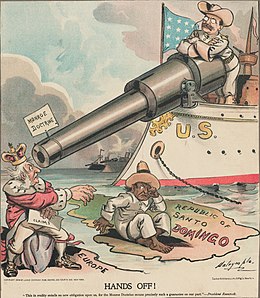
| ||
|---|---|---|
|
33rd Governor of New York
25th Vice President of the United States
26th President of the United States
First term
Second term
Post Presidency
 |
||
In the history of United States foreign policy, the Roosevelt Corollary was an addition to the Monroe Doctrine articulated by President Theodore Roosevelt in his State of the Union address in 1904, largely as a consequence of the Venezuelan crisis of 1902–1903. The corollary states that the United States could intervene in the internal affairs of Latin American countries if they committed flagrant wrongdoings that "loosened the ties of civilized society".[1]
Roosevelt tied his policy to the Monroe Doctrine, and it was also consistent with his foreign policy included in his Big Stick Diplomacy. Roosevelt stated that in keeping with the Monroe Doctrine, the United States was justified in exercising "international police power" to put an end to chronic unrest or wrongdoing in the Western Hemisphere. President Herbert Hoover in 1930 endorsed the Clark Memorandum that repudiated the Roosevelt Corollary in favor of what was later called the Good Neighbor policy.[2]
